Havana, April 26, 2010
“Year 52 of the Revolution.”
To: Director Maria Esther Reus Gonzalez
Minister of Justice
I, Ines Ramos Napoles, resident of Calle 4, number 119, between 1st and 3rd Playa, Havana, with ID Number 40012108557, in the name of my son, my family and myself, request the URGENT REVIEW of case No. 11/2008 of the Second Criminal Chamber of the People’s Provincial Tribunal of Havana. where Yamil Dominguez Ramos was sentenced to ten years in prison for the crime of trafficking in persons.
Yamil has always declared that he is innocent of these charges. To the court if was enough to judge him based on the initial declaration of Marleny Gonzalez Rodriguez, previously manipulated by an official of State Security, and so to find him guilty and not by virtue of an oral judgment, a declaration that had already been thrown out of court in a previous motion, showing clearly that it had been gotten from his wife under pressure, by telling her that it would benefit her husband.
We appeal for an annulment of the sentence. The Supreme Court overturned the ruling of the lower court and ordered a reconsideration and drafting of a new ruling eradicating the defects identified. (Attached is a copy of the Ruling No. 2929/2008 of the People’s Supreme Court).
However, on returning to the actions referred to the Provincial Court, with a change of date, roll number, and typography of the letter, it drafted the ruling in the same terms as the first and with the same errors. However, when we brought back the Appeal for an Annulment to the Supreme Court, far from questioning the role of the judges sanction by the court in the first place, for having ignored the order given, we found to our sad surprise that this time the Supreme Court, with other judges, ratified the second ruling of the Provincial Court. From then my son has served a sentence for a crime he did not commit. The process of review through an attorney cost us 500.00 CUC that we do not have. So today I am preparing this report to ask for a review of the case and with it, that JUSTICE be done. The decision is urgent, more so when Yamil, in claiming his civil rights which he was cruelly stripped of, has been on a hunger strike since April 14.
To continue, we explain the reasons that Yamil should not have been sentenced and deprived of his liberty:
First: Yamil has no need to traffic in human beings. He is a worker and a good father to his family. He emigrated legally to the United States of America on 7 December 2000, with his second wife and his two younger daughters. When he arrived in that country he worked hard to get ahead. First in a construction company, while studying for a university degree, with the objective, through his own efforts, of owning his own company. This allowed him to be successful financially. From the point of view of economics and finance, I repeat, my son Yamil has no need to traffic in persons.
Second:Yamil had no reason to take his family illegally out of the country. In February 2005, I went to the United States of America which he arranged. In September 2007, my sister and I had a passport visa and in October we received the letter of invitation to return on a visit to the United States, scheduled for the end of the year. In August of that year his elder daughter, from his first marriage, who was 13 at the time, was reunited with him, which he also arranged. By the way, since October 13, 2007, she has been without the protection of both of her parents, because her mother lives in Cuba. From August 24, 2007, he had from the U.S. Department of State, the paperwork for the visa process for Marleny Gonzalez Rodriguez, a visa that would allow his current wife to travel with her son to be reunited with him, so there was no reason to look for illegal means, let me repeat that the visa was already authorized for his current wife from the date previously mentioned and the file is open at the U.S. Interest Section until Yamil’s situation is resolved.
Third: My son has no need to enter this country illegally. He has visited Cuba seven times, four of them through Cancun. At 8:00 in the morning on October 13, according to what he told me on the phone on the 10th, he headed to Cancun on his own boat to participate in a marine event and then was planning to fly to Havana, carrying in his luggage 54 music CDs, a video camera, $1,900 U.S., the documentation for his oat and his passport in order, including the Cuban passport visa good until 2010. Due to two storms on the open sea (the Meteorological Institute of Cuba has confirmed these storms as actually occurring and not merely forecasts as written in the ruling) he sought assistance to enter the International Port at the Marina Hemingway. This was the only reason he approached the Cuban coast.
Yamil was forced into the nearest port by force majeure, which is allowed under international standards of navigation and, although he was not able to give prior notice of his arrival, Article 215, Paragraph 2 of the Criminal Code Act 62, exonerates him from criminal responsibility. On the other hand, every crime must be duly proved, as the sanctioning Board should not rely on the initial testimony of Marleny (his wife), which contrasts with that made Yamil and without a shred of evidence to support it, the reason that the Supreme Court in Case No.2929 signals the trial court; besides, my daughter-in-law accused, prior to the trial, the official of manipulating her and inciting her to declare false testimony, which she stated in oral testimony where she told the reality of the process, as well as the legal paperwork for the fiancée visa with which she could travel along with her son and that, as said before, the court omitted in its ruling, but that should be taken as documentary proof and that I am attaching in the form of a certified copy of this document.
If Yamil really intended to pick up Marleny in the area of La Puntilla (coastal zone separated from the Havana seawall at the mouth of the river Almendares) and, if Marleny really was in that place, why didn’t he do so, if the boat was in perfect physical condition, with two GPS receivers to inform him of his position and the distances of the Cuban boats, with sufficient fuel to get to Cancun or return to the United States? Yamil entered Cuban waters in the area of Habana del Este and traveling west, a mile from the coast, headed toward the Hemingway Marina International Port, being spotted by the Coast Guard ship around the Hotel Triton, where with his engines off he awaited the arrival of the Coast Guard and they escorted him to the international port, an action that corresponds to the testimony of the witness who escorted him. The route followed infers that my son passed through the area where supposedly Marleny was waiting but never came to pick her up. This act shows, without any doubt, that Yamil never had the intention to illegally pick up Marleny.
Fourth: The decision made by the disciplinary tribunal has ERRED IN THE LAW by stating that the participation of Yamil in these events is “proven,” and considering my son an intentional action of the crime of TRAFFICKING PERSONS , sanctioned in Article 348, Subsections 1 and 2, of the Criminal Case, which no doubt has influenced the decision handed down, punishing him with ten years’ imprisonment for a crime he did not commit. On the other hand, the sentence is not consistent with the evidence presented during the trail that might have influence on the verdict.From reading the narrative of events, recorded in the proven evidence of the sentence, it is not possible to understand precisely and clearly, what is the profit motive that is present in the actions allegedly undertaken by my son, or allegedly taken for him? It is evident that if true the argument that seeks to be substantiated in the sentence, such actions would be motivated exclusively by purely sentimental reasons and family reunification, particularly that the tribunal admitted as true in the fifth paragraph of the judgment in question where it says, “…the accused only intended to smuggle out of Cuba his fiancee and sin, not other people, nor did he have any interests other than sentimental and impressionable because he also endangered his own life…”If this is true as stated, I can assert that the facts, reported in the proven evidence, do not meet the legal significance required by the legislature to charge someone with the crime of trafficking, as erroneously charged. In the facts related and the proven evidence for which my son was punished, the element of criminality is not present, perhaps the most important for this offense which is “THE PROFIT MOTIVE.” In the Judgment No.476 of January 17, 2001, issued by the Criminal Chamber of the Supreme People’s Court, published in the pages of the 50 to 58, the Bulletin for the year 2001, the Supreme Judicial Body, ratifying such an approach by saying: “… Traffic in Persons (Art. 347.2 and 348.1 in relation to Articles 9.1.2 and 12.1 of the Criminal Code). The criminal provisions of Article 347.2 of the Penal Code has a body and life itself, its wording is clear and is violated by those who, “without being permitted to do so, motivated by profit, organize or promote the exit of the country people within it to third countries …. ” This ruling itself admits that in classifying this type of crime it can be omitted, including undertaking this kind of effort with no motive to profit, and one of the recitals says: “… assume the specific activities endorsed in these types, which do not fit any association or linkage of people who are in the country with others who are in other countries and vice versa, and much less when engaged in the Trafficking in Persons in violation of immigration regulations, or dedication does not exist, these activities are motivated by profit, because when there is such a connection and purpose with which we participate is to obtain economic benefit or personal gain of any kind, reflecting the broad sense that this term has , the conduct falls within the normal offense against the Immigration …. ” These fragments I have quoted illustrate the error of law committed by the Second Chamber and the Supreme Court in Case No. 2929/2008. From the above I consider that, based on the facts of the ruling of the Second Chamber of the Provincial Tribunal of Havana as “tested” the correct legal description could be then UNLAWFUL ENTRY IN THE NATIONAL TERRITORY. Such a misunderstanding of the Board is of extraordinary significance to the extent of the penalty that was applied (Ten years of imprisonment), for the crime described by the Board, even when made use of the 239 Agreement by the Governing Council of the Supreme Court, has a penalty under twenty to thirty years imprisonment or life imprisonment, while the crime allegedly committed by my son, is a framework of penalties of one to three years imprisonment or a fine of three hundred thousand shares. The adoption of the legal qualification I suggest, on the facts “proven” in the sentence, would bring an invaluable benefit for my son, who, besides being an honorable person, has no criminal record either in Cuba or the United States, and with appropriate consideration of his social and moral behavior there would be a substantial change in the length of the sentence, which would already have been served as he has been in custody for two years and eight months.
However, Yamil Dominguez should not spend even one more minute dispossessed of that which has no price, his freedom, and much less for a crime he did not commit. In addition to being a man of excellent hum qualities, of revolutionary origin, without a criminal record, and even were all the elements declared in the sentence to be “proven” were true, in our Penal Code Article 13.1 it is not punishable when a subject spontaneously avoids the criminal act. From the above it follows that if his intention had been to illegally collect his wife and son, he abandoned, by his own will, that act, and never even entered the area where they supposedly were waiting for him.
In hopes that the truth will win out and an error in the Justice will be amended, before the effects are worse for Yamil Dominguez and, in consequence, for his family.
Inés María Ramos Nápoles mother of Yamil Domínguez, and other relatives.
“In justice there can be no delay: and he that interferes with its fulfillment, turns it against himself.”
José Martí. (Complete works, volume 13, pág.320)
PD: Attached
Copy of the Ruling No. 2929/2008 of the People’s Supreme Court
Copy of the notarized document from the United States Interest Section in Havana attesting to a visa for Marleny Gonzalez and her son.
Copies of the Letters of Invitation from Inés María Ramos Nápoles and Migdalia Nery Ramos Nápoles.
CC: Council of State

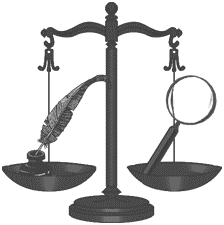 Juan, a commentator, told me he had sent a “Down with Fidel” email to the newspaper Granma, knowing that it is a crime in Cuba. He asked me what sanction they would impose if they found out who he is.
Juan, a commentator, told me he had sent a “Down with Fidel” email to the newspaper Granma, knowing that it is a crime in Cuba. He asked me what sanction they would impose if they found out who he is.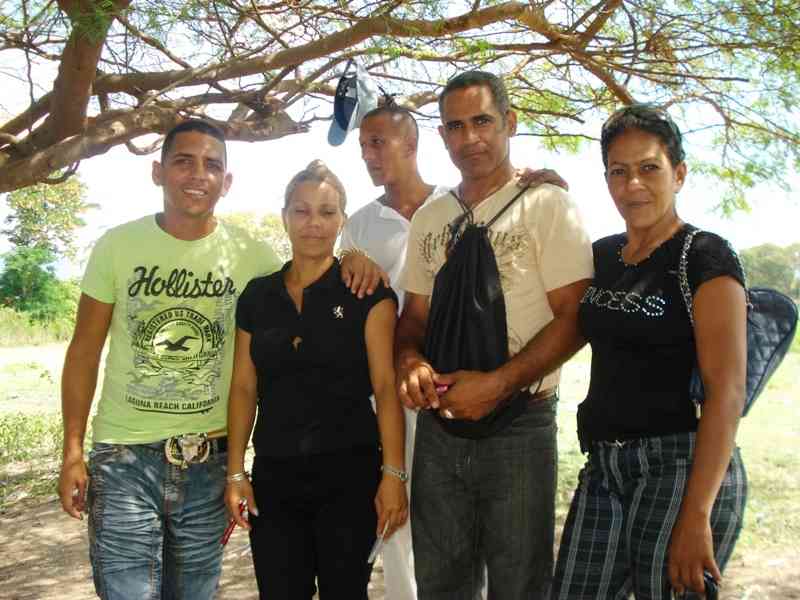
 The Cuban revolution ceased to exist in 1976. The death certificate was signed when they put into force a rigid constitution and institutionalized the country with a questionable political-administrative division.
The Cuban revolution ceased to exist in 1976. The death certificate was signed when they put into force a rigid constitution and institutionalized the country with a questionable political-administrative division. “Don’t believe, don’t fear, don’t beg.”
“Don’t believe, don’t fear, don’t beg.”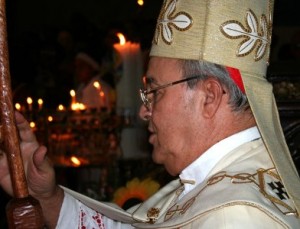
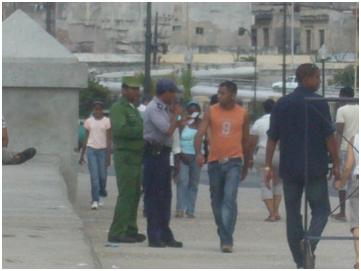
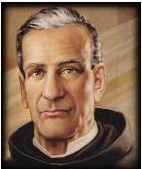 In 1833, when Havana was ravaged by cholera and there was a shortage of doctors, a boy of 13, immersed in the care of the sick, discovered his true vocation. When asked by one San Juan de Dios friars who observed him with curiosity whether he would like to serve God by caring for the sick, he answered, “Yes, Father, it is my greatest dream.” Almost immediately he took his vows of poverty, chastity and obedience and became part of the Brothers of St. John of God, a hospital order which had representatives in Cuba from 1603. This child who become a monk, and who had been placed by his parents a month after his birth in the Real Casa Cuna of St. Joseph the Patriarch, was Brother Olallo José Valdés.
In 1833, when Havana was ravaged by cholera and there was a shortage of doctors, a boy of 13, immersed in the care of the sick, discovered his true vocation. When asked by one San Juan de Dios friars who observed him with curiosity whether he would like to serve God by caring for the sick, he answered, “Yes, Father, it is my greatest dream.” Almost immediately he took his vows of poverty, chastity and obedience and became part of the Brothers of St. John of God, a hospital order which had representatives in Cuba from 1603. This child who become a monk, and who had been placed by his parents a month after his birth in the Real Casa Cuna of St. Joseph the Patriarch, was Brother Olallo José Valdés. After sorting through various possibilities, the Spanish journalist Lali Kazas and I agreed to rent a car and head to Ciego de Avila.
After sorting through various possibilities, the Spanish journalist Lali Kazas and I agreed to rent a car and head to Ciego de Avila.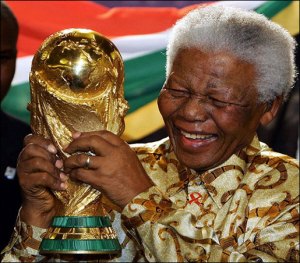 Morgan Freeman was at the finals. Seated in the VIP section of Soccer City with his dark baseball cap and a nervous expression on his face. Nervous in the angle the television offered us, of course. Perhaps two seconds later he would’ve been euphorically screaming if he rooted for Spain or would have been another disappointed one if he rooted for Holland.
Morgan Freeman was at the finals. Seated in the VIP section of Soccer City with his dark baseball cap and a nervous expression on his face. Nervous in the angle the television offered us, of course. Perhaps two seconds later he would’ve been euphorically screaming if he rooted for Spain or would have been another disappointed one if he rooted for Holland.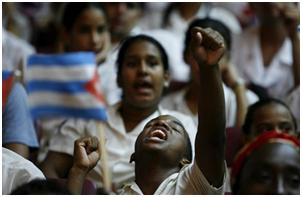 Exactly how do minors become affiliated with the Committees for the Defense of the Revolution?
Exactly how do minors become affiliated with the Committees for the Defense of the Revolution? However, I can assure you that less than 1% of the members of the CDR know the rules of the organization. The important thing is your commitment, not what you are committing to. They don’t care if you consent to the rules, nor if you comply with the obligations assumed.
However, I can assure you that less than 1% of the members of the CDR know the rules of the organization. The important thing is your commitment, not what you are committing to. They don’t care if you consent to the rules, nor if you comply with the obligations assumed.